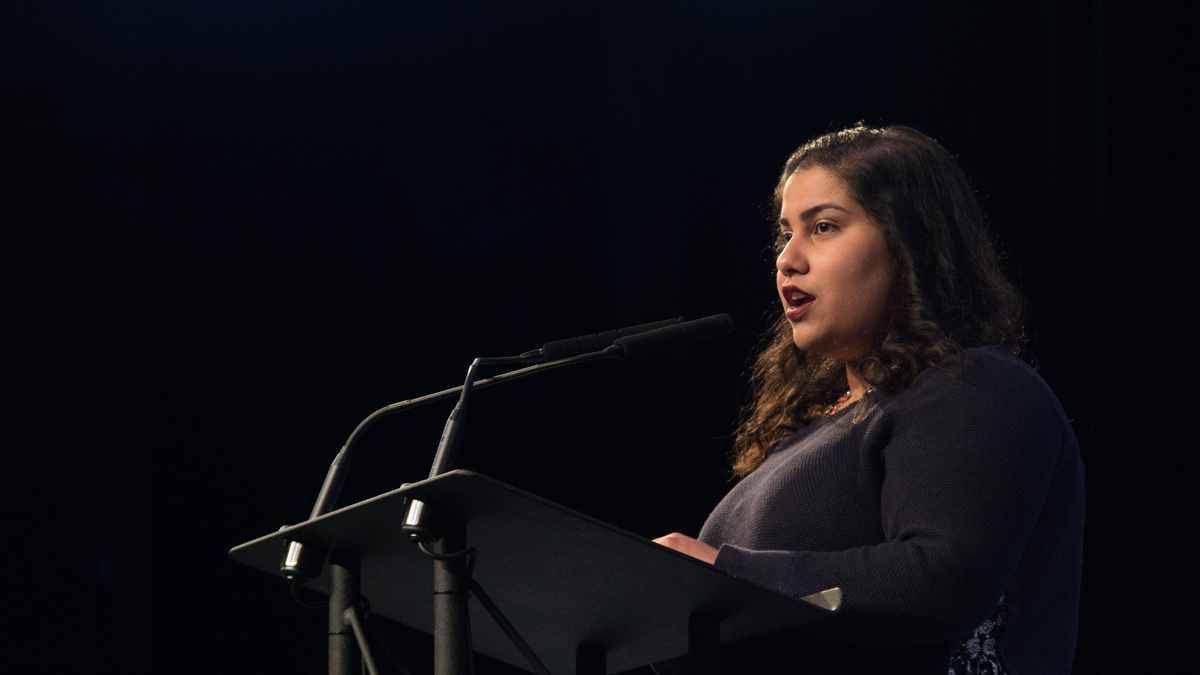 Richard Bagan
Richard Bagan Each year, The Gateway publishes an evaluation of the Students’ Union executive and the Board of Governors representative. It’s impossible to discuss every aspect of their tenures, so these reports are largely based on the major components of the platform each executive campaigned on, and the most significant responsibilities of their respective positions. These evaluations were informed by interviews with the executives themselves. The grading rubric can be found below. And if you’re short for time, check out our TLDR for a bite-sized breakdown.
Akanksha Bhatnagar: A-
The vice-president (academic) portfolio, with its focus on improving and streamlining the student academic experience, requires a great deal of time sitting on insane amount of committees and attending meetings. Bhatnagar, alongside fulfilling this work, has spearheaded tons of work on her own initiatives this year, making her the most accomplished out of the executive.
An important portfolio for the vice-president is pushing for affordable academic materials, primarily looking at open educational resources (OER) — educational materials licensed under Creative Commons that allow for free distribution, usage, and editing of said materials so long as the original author is credited. With OERs, students can save hundreds of dollars in comparison to traditional textbooks and materials. Bhatnagar has made OERs front-and-centre this year, being elected chair of the OER Advocacy Group and running initiatives like the BeSmart Book Fair, which brought together student, professors, and librarians to talk about textbook options of classes and sprinkle in language about OERs. OERs are one of the most concrete ways students can begin to save money and afford to take classes, so practical focus on this area is a huge win for Bhatnagar.
Bhatnagar also spearheaded the effort to successfully rid campus of iClickers through her seat on the Committee on the Learning Environment, which will go down as likely the most tangible impact students will feel as a result of her vice-presidency. iClickers are costly, annoying, awful devices you might only use once in your academic career depending on your faculty, so good riddance.
Creating a student census to help the university provide specialized services to students was a big talking point of Bhatnagar’s campaign. Originally outlined as a multi-year project, Bhatnagar spent this year creating demographic surveys for student representatives, gathering initial data before an official student survey will be launched — this will be the responsibility of next year’s vice-president (academic). This demographic data-collecting and survey-testing is a great place to start laying the groundwork for the larger student census; I can only hope that next year’s vice-president takes the work done here and continues it.
Bhatnagar also made progress on her platform of improving academic advising. An academic advising survey, created by the COFA Advisory Board, has been circulating, and a formal report will be written up after student elections. Bhatnagar also worked heavily on a new transfer credit articulation committee as a way to address advisors not knowing how to walk students through things like transfering credits. Bhatnagar hopes that the committee will help gather hard data to present to the university in regards to advisory issues. Both of these things are certainly a start to solving the issues, but dedicated time and work must be done in order to make sure these initiatives keep being championed.
The most controversial decision Bhatnagar made this year was to bring back GovWeek. The event, which consists of panels and workshops designed to help students learn more about student governance, has had notoriously poor turn-out rates in the past. If there was anyone who could save GovWeek, it was Bhatnagar, and to her credit, GovWeek had its highest-ever turnout this year, with every event having over 80 people attend. Bhatnagar has stated that GovWeek will be returning next year, and I can only hope that next year’s vice-president will learn and build on improvements to GovWeek made this year.
TLDR: Bhatnagar has substantially began or completed work on many of her central campaign platforms, such as affordable academic materials and the student census, as well as picked up and completed new initiatives along the way, such as getting rid of iClickers. Many of her initiatives, however, are multi-year, meaning that the success of some of these initiatives will have to rely on an incoming vice-president for them to be carried to completion.
Rubric:
A-range: This person has fulfilled the promises they campaigned on, has created tangible change during their tenure, and has shown a commitment to improving the lives of students. Their GPA is looking good.
B-range: This person has done their job consistently well, but has not made any remarkable changes, or has fallen short on important goals they set out in their platforms. They’re doing fine, but it’s nothing to phone home about.
C-range: This person has done their job sufficiently, but has failed to make significant progress in the areas most relevant to their portfolio, or has essentially abandoned a major part of their platform. They’re still passing with a safe buffer though, and Cs get degrees!
D-range: This person has done a very lacklustre job, and has not sufficiently fulfilled their campaign promises or the responsibilities of their position.
F-range: This person has not done their job, has not represented students, and has not fulfilled their campaign promises whatsoever.




